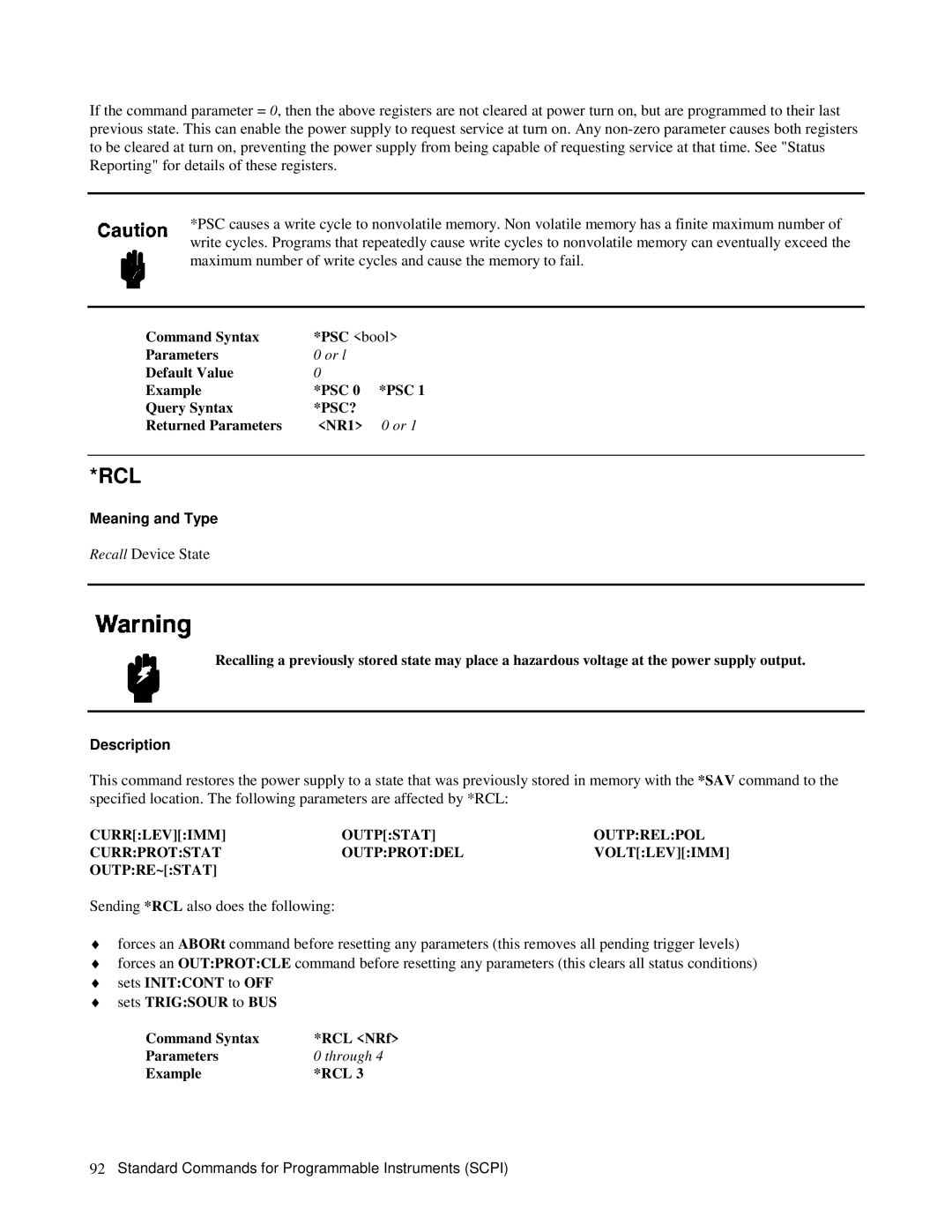Operating Manual
Certification
Before Applying Power
Do not Service or Adjust Alone
General
Environmental Conditions
Safety Symbols
Declaration
EMC
Herstellerbescheinigung
Manufacturer’s Declaration
Table Of Contents
Table Of Contents
Blank Front Panel Option
VAC Input Power Option
Standard Commands for Programmable Instruments
Index
Introduction
Description
Options
Safety Considerations
Accessories
Instrument and Manual Identification
GP-IB Interconnection Cables and Connectors
GP-IB Compatibility
Ordering Additional Manuals
Model
Ieee
Specifications
Related Documents
Performance Specifications Agilent Technologies Model 6033A
6038A
6030A
6031A
6032A
6035A
Supplemental Characteristics
Agilent Model
6035A 6038A
General Information
Initial Inspection
Preparation For Use
Rack Mounting
Input Power Requirements
Power Connection
Power-Cord Plug Configurations
Line Voltage Option Conversion
Installation
Line Voltage Conversion Components
AC Line Impedance Check
Repackaging For Shipment
Rear Panel Screw Sizes and Part Numbers
Agilent Models 6030A, 6031A, 6032A, 6035A
Agilent Model 6033A
Agilent Model 6038A
Operating Instructions
Controls and Indicators
Output Range For An Autoranging Power Supply
Number Controls/Indicators
Overrange Operation Controls and Indicators Description
Operating Instructions
Turn-On Checkout Procedure
OVP Adjust
Factory Settings, Mode Switch
Initial Setup and Interconnections
Connecting the Load
Cross Section Area Mm2 Kft 10A 17 a
Maximum Wire Lengths To Limit Voltage Drops
AWG
Stranded Copper Wire Ampacity Wire Size
Cross Section Area in mm2 Ampacity
Connecting a Bypass Capacitor Overvoltage Protection OVP
Remote Voltage Sensing
Foldback Protection
Mode Switches
Remote Voltage Sensing
Mode Switches
Mode Switches Programming Mode
GP-IB/RPG
Voltage Resistance
Monitor Signals
Protective Circuits
Local Operation
Constant Voltage Operation
GP-IB Operation
Constant Current Operation
Return to Local
Interface Functions
Operating Instructions
GP-IB Address Selection
RQS
Serial Poll Register
ERR RDY PON FAU
Initial Conditions
Power-On Service Request
INH-FLT or RLY LNK Operation
OVP
Output Adjust
Programming Syntax
Unmask CC,OR,FOLD Unmask CC, OR, Fold
Unmask CC or Fold
Vset 5 V VSET5V
VMAX? Vmax ?
VSET? ISET? VOUT? IOUT? OVP?
VMAX? IMAX?
HOLD?
Command
GP-IB Commands Range or **Response To Query Description
TRG
STS? ASTS?
FAULT?
UNMASK?
SRQ OFF SRQ SRQ on SRQ SRQ? CLR ERR?
SRQ OFF
TEST? ID?
Vout 15VIOUT 5A Vout 15V Iout 5A
Format of Numbers Sent from Power Supply
STS? FAULT? ASTS? ERR? UNMASK? TEST?
VSET? ISET? DLY? VOUT? IOUT? VMAX? IMAX?
FOLD? HOLD? OUT? SRQ?
VSET?
Iset Iset 5 a Iset 5 MA
DLY?
Vmax Imax Vmax 15 Imax 5 a Vmax 15 MV Imax 5 MA
OUT on RST
OUT ?
HOLD?
STS?
Output PS1 Hold ON’’ 5A’’
STO
Status Register Bit Position Bit Weight
Condition
Fold
ERR
Unmask
Fault
Unmask CC, OR, ERR
TEST?
Error # 10. Status Register Errors Description
No Errors
Analog Programming
Resistance Programming of Output Voltage
Multiple-Supply Operation
10. Voltage Programming of Output Voltage
12. Resistance Programming of Output Current
14. Auto-Parallel Operation
Series Operation
Fault Input FLT and Remote Inhibit INH Connections
15. Series Operation
16. FLT/INH Connections
19a. FLT and INH with Multiple Supplies
20. Timing Diagram
Page
Using Appendix a
General Information Description
Scope of Appendix a
Manual Changes
Section ll Manual Changes
Section lll Manual Changes
Page
Page
Possible failure
Turn-On Check Out Procedure
Introduction
Table B-1. ID Query Response Agilent Model
Response
Vset 20 Iset
STS
String
Table B-2. CC Check Command String Agilent Model
Overvoltage Protection Setting
Page
Standard Commands for Programmable Instruments Scpi
Introduction
Linked Connections
GP-IB
Common Commands
Subsystem Commands
Keywords
Parameters
Figure C-2. Common Command Syntax Diagram
Command Syntax
Bit Configuration of Standard Event Status Enable Register
Meaning and Type
PON CME EXE DDE QYE
ESR?
ESE?
ESR? *PSC *STB?
Pending operations are complete when
OPC?
Command Syntax PSC bool Parameters
Default Value Example PSC
PSC?
Returned Parameters NR1
Command Syntax*SAV NRf Parameters Example
RST
Bit Configuration of Status Byte Register
SRE?
Oper
1MSS ESB MAV Ques
TRG
TST?
WAI
Abor Abort
Command Syntax SOURceCURRentPROTectionSTATe bool Parameters
Currlev
Currprotstat
Curr Prot Stat 0 Current Protection State OFF
Init Initiate Immediate
Initcont 1 Initiatecontinuous
Meas CURR? Meas VOLT? Measure Voltage DC? MV
Outp 1 Output State ON, Norelay
Outpprotdelmin Outputprotdelay MAX
Outpprot
Outp Prot CLE Output Protection Clear
OUTPPROTDEL? MIN OUTPPROTDEL? MAX
STATOPEREVEN?
Bit Configuration of Operation Registers
Status Operation Registers
NTR/PTR Commands
Bit Configuration of Questionable Registers
Statpres
Status Questionable Registers
STATQUESEVEN?
STATQUESCOND?
Statquesenab
Syst ERR? System ERROR?
Statquesntr 16 Statusquestionableptr
STATQUESNTR? STATQUESPTR?
Systlang Tmsl Systemlanguage Compatibility
Trigsour
Questionable Status Group
VOLTPROTAMPL?
Volt PROT? Voltage Protection AMPLITUDE?
Bit Signal
Status Byte and Service Request Enable Registers
Questionable Status Group
Standard Event Status Group
Register
PTR NTR
Service Request Enable Register
Status Programming Examples
ESE
Status Byte Register
Standard Event Status Register Error Bits
Device-Dependent Errors
Output Queue
SRE
Error Number
Initimm Initcont INITCONT? MEASCURRDC?
Scpi Command Summary
Command Summary Subsystem Commands
Common Commands
ARPS/SCPI Commands
Table C-6. Comparison of Arps and Scpi Commands
Equivalent Scpi Command
Arps
Page
Path Names
Initialization
Voltage and Current Programming
Output @PS Vset
Voltage and Current Readback
Output @PSVOUT? Enter @ PSA
END While
Output Inhibit / Enable
Power Supply Status
Present Status
ERR Fold
Accumulated Status
Output @PSUNMASK CC, OR, OV,AC
Fault and Mask Registers
Serial Poll
RQS ERR RDY PON FAU
SPOLLRESP= Spoll @PS
Service Request
Output @PSSRQ on Output @PS~SRQ OFF
Output @PS ERR? Enter @PSERRCODE
Delay Time
Programming Error Detection
OFF KEY
Fault Indicator FLT and Inhibit INH
Protection Functions
Overvoltage
Foldback
Hold Mode
Advanced Topics
Machines States
Output @PSSTO 10RCL
210 ! Loop Through the States 10 Times
Page
Index
GET
Atsl Ieee
OC bit 98, 101
SH1 SR1
Tmsl
United States Canada
Europe Japan
Latin America Australia/New Zealand
Asia Pacific
Manual Updates

